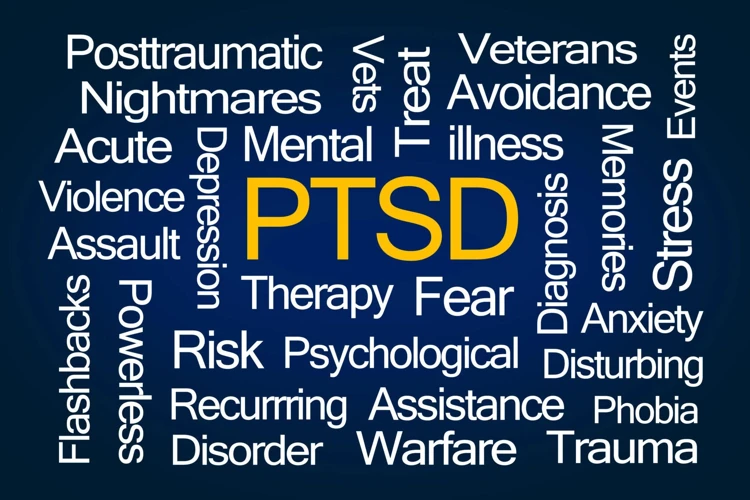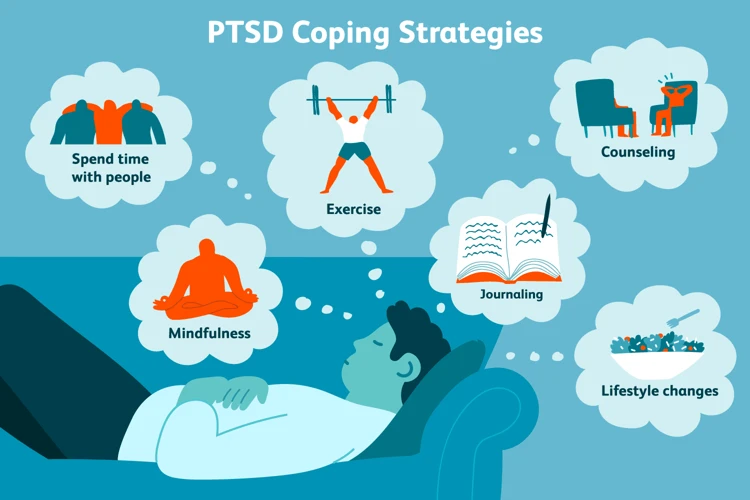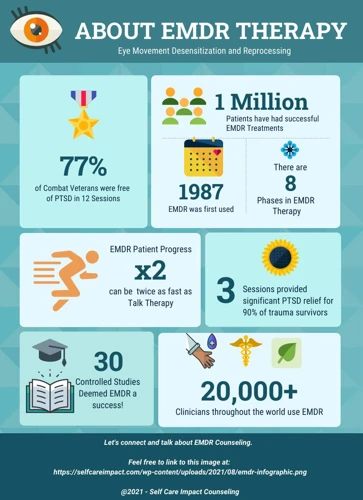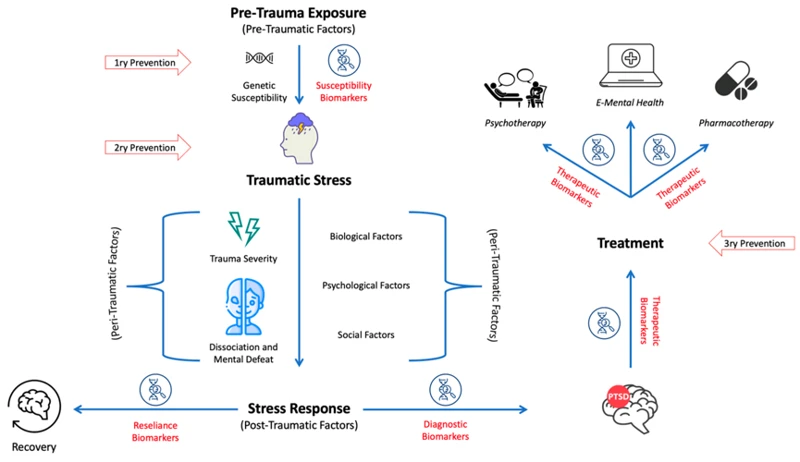As we close our eyes and drift into the world of sleep, we hope to find rest and peace. However, for those who have experienced trauma, this serene state can turn into a nightmare. Nightmares can be vivid and disturbing, leaving one feeling anxious and unsettled even after waking up. The connection between trauma and nightmares can be perplexing and confusing, leaving many wondering if there is a way to find relief. In this article, we’ll explore the intricate relationship between trauma and nightmares, how trauma triggers these disturbing dreams, and ways to find treatment and manage them at home. Let’s delve into this topic to understand what you need to know.
Understanding Trauma and Nightmares

Trauma and nightmares can be overwhelming experiences that can significantly impact a person’s mental and emotional well-being. To fully understand the connection between the two, it is important to individually examine what constitutes trauma and what nightmares entail. By exploring what these terms mean and how they affect an individual, it becomes clearer as to why they are often interconnected. This section delves into the intricacies of trauma and nightmares, providing insight into what they are and how they can impact a person’s life.
What is Trauma?
Trauma can be defined as a distressing or deeply disturbing experience that overwhelms an individual’s ability to cope. It is often caused by a single event or a series of events that are perceived as physically or emotionally harmful, threatening, or dangerous. Trauma can have various impacts on people, including physical and emotional symptoms that can be short-lived or long-lasting.
Physical symptoms of trauma may include headaches, fatigue, insomnia, and digestive problems. On the other hand, emotional symptoms can be a wide range of feelings such as anxiety, depression, guilt, shame, anger, and hopelessness. A person who has experienced trauma may also develop PTSD or Post-Traumatic Stress Disorder, which is a mental health condition that can cause recurring nightmares, flashbacks, and intense emotional responses.
Trauma can occur at any age and can be caused by various situations. According to the American Psychological Association, some of the most common sources of trauma include:
| Events | Description |
|---|---|
| Physical, sexual, or emotional abuse | Intentional harm or cruelty inflicted by another person or a group of people, can leave long-lasting physical and emotional scars. |
| Natural Disasters | Such as hurricanes, earthquakes or wildfires, can cause wide-spread damage and result in serious injury or loss of life. |
| Accidents or Injuries | Car, airplane or workplace accidents, falls, and other serious injuries can cause trauma. |
| Life-Threatening Illnesses | Chronic or life-threatening health conditions can cause significant distress and trauma. |
It is important to note that traumatic experiences can affect each person differently, and not everyone who experiences trauma will develop traumatic nightmares or other symptoms. There are several factors that can determine how an individual responds to trauma, including their age, previous experiences, level of support, and mental health history.
What are Nightmares?
Nightmares are unsettling dreams that can cause a person to wake up feeling scared, anxious, or distressed. They often involve vivid and disturbing imagery that can be difficult to shake off even after waking up. Nightmares can be distinguished from bad dreams by their intensity, frequency, and the emotions they evoke in the dreamer.
| Symptoms of Nightmare Disorder | Causes of Nightmares |
|---|---|
| – Frequent awakenings during sleep with a vivid recall of a frightening dream | – Stress and anxiety |
| – Difficulty falling back asleep after a nightmare | – Trauma and PTSD |
| – Daytime sleepiness or fatigue due to poor sleep quality | – Grief and loss |
| – Fear of going to sleep or avoidance of sleep | – Substance abuse or withdrawal |
Nightmares are more common in children than in adults, but they can occur at any age. They can also be a symptom of a larger sleep disorder known as nightmare disorder. This disorder is diagnosed when recurring nightmares cause significant distress, impair daytime functioning, or lead to a fear of going to sleep.
Nightmares can have a negative impact on a person’s overall well-being, causing anxiety, depression, and even post-traumatic stress disorder (PTSD). Fortunately, there are treatment options available to help individuals experiencing trauma-related nightmares. These treatments can range from counseling and therapy to medications and lifestyle changes.
The Connection Between Trauma and Nightmares

As if surviving through traumatic experiences isn’t challenging enough on its own, the aftermath can come with its own set of complications. Many trauma survivors often find themselves haunted by vivid and distressing nightmares that can go on to disrupt their sleep and cause further distress. The link between trauma and nightmares can be so strong that these individuals start to dread bedtime and might even begin to develop insomnia. Understanding how trauma and nightmares intersect can be the first step in managing these symptoms and reclaiming a peaceful night’s rest.
How Trauma Triggers Nightmares
The way trauma triggers nightmares is complex and varies from person to person. However, some common processes in the brain can help us understand how traumatic experiences lead to nightmares.
One of the key ways trauma triggers nightmares is by impacting the amygdala, a part of the brain responsible for processing emotions. When a person experiences a traumatic event, the amygdala can become overstimulated and hypersensitive, making it more likely to react to perceived threats in the future. This can lead to a heightened state of arousal and feelings of fear, making it easier for nightmares to occur.
Traumatic experiences can also impact a person’s ability to form memories properly. Research has shown that memories of traumatic events can be fragmented or incomplete, making it harder for the brain to process and make sense of the experience. This can result in the traumatic event being replayed in a person’s dreams or nightmares as their brain attempts to make sense of what happened.
Another way trauma can trigger nightmares is by disrupting sleep patterns. Sleep is essential for processing memories and regulating emotions, but trauma can lead to difficulty falling asleep or staying asleep. This can result in fragmented, restless sleep that is more likely to be interrupted by nightmares.
Ultimately, the way trauma triggers nightmares is a complex and multi-faceted process. While some common neurological and emotional factors are at play, each person’s experience is unique and may be influenced by a wide variety of internal and external factors.
The Role of PTSD in Nightmares
Post-traumatic stress disorder (PTSD) is a serious mental health condition that can develop after a person has experienced or witnessed a traumatic event. It is a common cause of frequent nightmares in people who have experienced trauma. Here are some ways PTSD plays a role in nightmares:
- Re-experiencing symptoms: People with PTSD may experience a set of symptoms called re-experiencing. This can include intrusive memories, flashbacks, and nightmares. These nightmares can be particularly vivid and disturbing and are often related to the traumatic event that caused the PTSD.
- Nightmare Disorder: According to the DSM-5, nightmares that occur as part of PTSD fall under a separate diagnosis called “Nightmare Disorder.” It is characterized by frequent nightmares that cause significant distress or impairment. People with PTSD are at a higher risk of having this disorder.
- Hyperarousal: One of the symptoms of PTSD is hyperarousal, where a person is constantly on edge, easily startled, and has trouble sleeping. This heightened state of arousal can make it more difficult to fall and stay asleep, leading to more nightmares.
- Avoidance behaviors: People with PTSD may avoid situations or activities that remind them of the traumatic event. This can include avoiding sleep or bedtime if they associate it with nightmares. However, avoidance can actually worsen nightmares, as it prevents the person from confronting the underlying issues that are causing the nightmares.
- Anxiety and Fear: PTSD is characterized by high levels of anxiety and fear. This can contribute to the frequency and intensity of nightmares. In some cases, a person may be afraid to go to sleep, anticipating nightmares or flashbacks.
It is important to note that not everyone who experiences trauma develops PTSD or nightmares, and there are various factors that can contribute to the development of these conditions. However, for those who do develop PTSD and experience nightmares, it is important to seek treatment from a mental health professional.
Common Themes in Trauma-Related Nightmares
Trauma-related nightmares often involve recurring themes that reflect the individual’s experiences and emotions. These themes may vary from person to person, but some of the most common ones include:
- Re-living the Traumatic Event: One of the most common themes in trauma-related nightmares is re-living the traumatic event. This can include seeing the event play out as if it were happening again, or feeling as if the person is trapped in the event and unable to escape.
- Feeling Helpless or Vulnerable: Another common theme is feeling helpless or vulnerable. This can include being chased, attacked, or abducted, and feeling powerless to stop it.
- Feeling Unsupported: Trauma-related nightmares may also involve feeling unsupported or alone. This can include being abandoned by loved ones or feeling as if nobody understands what the person is going through.
- Loss or Betrayal: Another common theme is loss or betrayal. This can include losing a loved one, being betrayed by someone the person trusted, or feeling as if they have lost a part of themselves.
- Physical Pain or Harm: Trauma-related nightmares may also involve physical pain or harm, such as being injured or tortured.
- Revenge or Retribution: Some individuals may experience trauma-related nightmares that involve seeking revenge or retribution against those who hurt them.
It’s important to remember that not everyone who experiences trauma will have nightmares, and not all nightmares are related to trauma. However, if an individual is experiencing recurring nightmares that are causing distress or interfering with their daily life, it may be a sign that they need to seek help from a mental health professional.
Treatment Options for Trauma-Related Nightmares

When it comes to addressing trauma-related nightmares, there are a variety of treatment options available to those in need. Many individuals who experience these types of nightmares may feel overwhelmed and unsure of where to turn, but it’s important to know that there is help out there. Depending on the severity and underlying cause of the nightmares, different types of treatments may be recommended. In this section, we will explore some of the most commonly used options for addressing trauma-related nightmares.
Counseling and Therapy
Trauma-related nightmares can have a significant impact on an individual’s quality of life. In some cases, these nightmares can even cause the affected individual to develop anxiety and depression. Fortunately, there are a variety of treatment options available for those struggling with trauma-related nightmares.
Counseling and therapy can be particularly effective in treating trauma-related nightmares. Therapy can provide a safe and supportive environment for individuals to discuss their experiences and emotions and learn how to manage their symptoms more effectively. There are several types of therapy that may be utilized in the treatment of trauma-related nightmares, including:
| Therapy Type | Description |
|---|---|
| Cognitive-behavioral therapy (CBT) | Focused on challenging and changing negative thought patterns and behaviors that may be contributing to nightmares |
| Exposure therapy | Involves gradually exposing the individual to the source of their trauma in a controlled setting, helping to desensitize them to the experience over time |
| Eye movement desensitization and reprocessing (EMDR) | Uses a combination of eye movements, tones, and tapping to help the individual process traumatic experiences and reduce the intensity of associated emotions and symptoms |
Working with a qualified therapist can be incredibly beneficial in helping individuals learn to cope with trauma-related nightmares. A trained therapist can help individuals develop coping mechanisms, reduce anxiety, and reframe negative thought patterns.
It is important to note, however, that not all types of therapy or therapists may be equally effective. It is crucial to find a therapist with experience treating trauma-related nightmares specifically, as they will have specialized knowledge and training in treating this particular issue.
Medications
Medication can be a helpful tool for managing trauma-related nightmares, especially if other treatments have not been effective or if the nightmares are severely impacting everyday life. Antidepressants are commonly prescribed for this purpose, as they can help regulate sleep and reduce the intensity and frequency of nightmares. Prazosin is a medication that was originally developed to treat high blood pressure, but has been found to be effective in reducing nightmares in individuals with PTSD. It works by blocking certain receptors in the brain that are associated with the fight or flight response.
Another medication that may be prescribed is clonidine, which is also used to treat high blood pressure. Like prazosin, it has been found to be effective in reducing the occurrence of nightmares in people with PTSD. Beta-blockers are another type of medication that may be prescribed. They work by blocking the effects of adrenaline in the body, which can help reduce the intensity of nightmares.
It is important to note that medication should always be taken as prescribed by a healthcare professional. Abruptly stopping medication or changing the dosage can have negative effects on both physical and mental health. Additionally, medications may cause side effects and may not be appropriate for everyone. It is important to discuss the benefits and risks of medication with a healthcare professional before starting any new medications.
Lifestyle Changes
Making lifestyle changes can greatly impact the frequency and intensity of trauma-related nightmares. Here are some changes that can be made:
- Reduce alcohol and drug use: Alcohol and drug use can disrupt sleep patterns and make nightmares worse. Alcohol and drugs can interfere with the effectiveness of medication taken for nightmares. It is important to limit or eliminate the use of these substances.
- Exercise regularly: Regular exercise can reduce stress levels and help regulate sleep patterns. Try incorporating exercise into your daily routine, but avoid exercising too close to bedtime.
- Stick to a sleep schedule: Creating a consistent sleep schedule can help train your body to fall asleep and wake up at the same times each day. This can also help reduce the occurrence of nightmares.
- Practice relaxation techniques: Relaxation techniques, such as deep breathing, meditation, and progressive muscle relaxation, can help calm the mind and body before bed. These techniques can also be used if nightmares wake you up in the middle of the night.
- Avoid stimulating activities before bed: Activities such as watching TV, using your phone, or working on your computer can stimulate the brain and make it harder to fall asleep. It is best to avoid these activities for at least an hour before bedtime.
By making these lifestyle changes, you can take control of your sleep patterns and reduce the occurrence of trauma-related nightmares.
Managing Trauma-Related Nightmares at Home

If you’re struggling with trauma-related nightmares, there are steps you can take to manage them from the comfort of your home. These strategies can help you feel more in control and empowered, even in the midst of the distress and anxiety that often accompanies vivid, unsettling dreams. By incorporating relaxation techniques, creating a soothing bedtime routine, and avoiding potential triggers, you can start to take charge of your sleep and work towards a greater sense of peace and well-being. So how exactly can you manage trauma-related nightmares at home? Let’s explore some practical tips and strategies.
Practice Relaxation Techniques
One effective way to manage trauma-related nightmares at home is to practice relaxation techniques. These techniques can help calm the body and mind, making it easier to fall asleep and reducing the likelihood of experiencing nightmares. Here are some relaxation techniques to consider:
- Deep breathing: Taking slow, deep breaths can calm the nervous system and promote relaxation. Inhale slowly through the nose, hold for a few seconds, and exhale slowly through the mouth.
- Progressive muscle relaxation: This technique involves tensing and relaxing individual muscle groups throughout the body, starting at the toes and working up to the head. By focusing on these sensations, it can help distract from negative thoughts and feelings.
- Meditation or mindfulness: These practices involve focusing on the present moment and accepting thoughts and feelings without judgment. This can help reduce stress, increase self-awareness and promote relaxation.
- Visualization: This involves imagining peaceful or positive scenes, such as walking on a beach or a peaceful garden. This can help distract from negative thoughts and promote relaxation.
- Aromatherapy: Certain scents and oils such as lavender, chamomile, and bergamot can promote relaxation and calmness. Consider using a diffuser or incorporating them into your bedtime routine by adding essential oils to your bath or using a scented lotion.
By incorporating these techniques into your daily routine, you can help manage trauma-related nightmares and promote a better night’s sleep. It’s important to find the right combination of techniques that work for you and to make relaxation part of your regular self-care routine.
Create a Comforting Bedtime Routine
A comforting bedtime routine can be very helpful for managing trauma-related nightmares. To create a routine that works for you, consider the following tips:
- Create a relaxing environment: Try to create a peaceful environment in your bedroom that promotes relaxation. This may include dimming the lights, using comfortable bedding, and minimizing disruptive noises.
- Practice relaxation techniques: Incorporating relaxation techniques, such as deep breathing or meditation, can help calm your mind before bed.
- Limit screen time before bed: Exposure to electronic screens before bed can disrupt natural sleep patterns, so try to avoid using electronics for at least an hour before going to sleep.
- Avoid consuming stimulants: Tea, coffee, and other stimulants can make it difficult to fall asleep. Make sure to avoid consuming these substances in the hours leading up to bedtime.
- Develop a consistent routine: Going to bed and waking up at the same time every day can help regulate your sleep cycle and promote more restful sleep.
By implementing these tips, you can create a comforting bedtime routine that promotes relaxation and reduces the likelihood of experiencing trauma-related nightmares.
Avoid Stimuli That Trigger Trauma-Related Nightmares
One way to manage trauma-related nightmares is to avoid stimuli that may trigger them. This can include anything that reminds the individual of their traumatic experience. The following table highlights some common triggers for trauma-related nightmares and suggestions for avoiding them.
| Potential Triggers | Avoidance Strategies |
|---|---|
| Watching violent or intense movies/tv shows | Avoid programs with triggering content before bed |
| Reading graphic news stories or books | Avoid reading material with triggering content before bed |
| Certain smells or sounds that remind the individual of the traumatic experience | Identify triggering smells or sounds and avoid them, if possible |
| Being in certain settings or situations that remind the individual of the traumatic experience | Avoid those settings or situations, if possible |
| Interacting with certain people who remind the individual of the traumatic experience | Avoid or minimize interactions with those people, if possible |
It is important to note that avoiding triggers may not always be possible, so it’s important to have additional coping skills in place. If avoidance isn’t working or feels too restrictive, it may be helpful to speak with a therapist or counselor for additional strategies. Remember, managing trauma-related nightmares is a process and may take time to find what works best for each individual.
Reach Out for Support
Dealing with trauma-related nightmares can be a difficult and isolating experience, but it’s important to remember that you don’t have to go through it alone. Reaching out for support is an essential part of the healing process. Here are some options to consider:
- Friends and Family: Sometimes the people closest to us can offer the most comfort and support. Don’t be afraid to talk to your loved ones about your experiences and how they’re affecting you.
- Support Groups: Connecting with others who have experienced trauma can be incredibly validating and helpful. Look for local support groups or online forums where you can share your story and receive support.
- Therapists and Counselors: Trauma-focused therapy can be highly effective in treating both the underlying trauma and the resulting nightmares. Look for a therapist who specializes in trauma and PTSD, and consider options like Cognitive Behavioral Therapy (CBT) or Eye Movement Desensitization and Reprocessing (EMDR).
- Crisis Hotlines: If you’re feeling overwhelmed or in crisis, don’t hesitate to call a crisis hotline. These resources are available 24/7 and can offer immediate support and guidance.
Remember, there’s no shame in seeking help. Trauma-related nightmares can be incredibly distressing, but with the right support and resources, you can find relief and healing.
When to Seek Help
It can be difficult to determine when seeking help for trauma-related nightmares is necessary. However, it’s important to take action sooner rather than later, as untreated nightmares can lead to increased stress, anxiety, and decreased quality of life.
Some signs that it may be time to seek help include: experiencing frequent, intense, or disruptive nightmares; avoiding sleep or experiencing disturbances in sleep; feeling fear or anxiety around bedtime; experiencing flashbacks or other symptoms of trauma during waking hours; struggling to function in daily life, such as at work or in relationships; and feeling hopeless or helpless about the nightmares.
If any of these signs apply to you or a loved one, it’s important to reach out to a healthcare professional for help. A therapist or counselor can help by providing techniques and strategies to address the nightmares and the underlying trauma. Medication, such as antidepressants, may also be prescribed to help manage symptoms.
However, it’s also important to note that seeking help doesn’t have to mean professional intervention. Sometimes, simply talking to a trusted friend or family member about the nightmares can provide relief and comfort. Engaging in self-care practices, such as exercise or mindfulness, can also be effective in managing nightmares.
Ultimately, the decision to seek help is a personal one, but it’s important to remember that effective treatment options are available and that seeking help is a sign of strength, not weakness.
Conclusion
In conclusion, it is crucial to understand the connection between trauma and nightmares. Trauma can trigger nightmares, which can be distressing and have negative impacts on a person’s quality of life. However, there are various treatment options available for those suffering from trauma-related nightmares.
Counseling and therapy can be highly effective in helping individuals process and cope with trauma, which can in turn reduce the frequency and intensity of nightmares. Medications may also be used in conjunction with therapy, although it is important to note that they may not be suitable for everyone and should only be used under the guidance and supervision of a healthcare professional.
Making lifestyle changes, such as maintaining a regular sleep schedule and engaging in relaxation techniques, can also be helpful in managing trauma-related nightmares. Creating a comforting bedtime routine and avoiding stimuli that trigger nightmares can further reduce their occurrence.
It is important to remember that seeking help is not a sign of weakness. If trauma-related nightmares are impacting your daily life and functioning, it may be time to seek professional support. With the help of a skilled therapist or healthcare provider, individuals can learn to manage and overcome trauma-related nightmares, improving their overall quality of life.
Frequently Asked Questions
Can trauma cause nightmares?
Yes, trauma can cause nightmares. Trauma affects the way our brain processes information, leading to distressing dreams and nightmares.
What is PTSD?
PTSD, or Post-Traumatic Stress Disorder, is a mental health condition that develops after experiencing or witnessing a traumatic event. It can cause intense anxiety, nightmares, and flashbacks.
What are some common themes in trauma-related nightmares?
Common themes in trauma-related nightmares include reliving the traumatic event, feeling helpless or trapped, and experiencing intense fear or anxiety.
Can medication help with trauma-related nightmares?
Yes, medication can be helpful in managing trauma-related nightmares. Antidepressants and other medications can reduce anxiety and regulate sleep patterns.
What kind of therapy can be beneficial for trauma-related nightmares?
Cognitive Behavioral Therapy (CBT) and Exposure Therapy can be beneficial for trauma-related nightmares. These therapies aim to reframe negative thoughts and desensitize the individual to traumatic memories.
How can lifestyle changes help manage trauma-related nightmares?
Lifestyle changes such as regular exercise, avoiding alcohol and drugs, and establishing a consistent sleep schedule can all contribute to better sleep and potentially reduce nightmares.
What are some relaxation techniques that can help manage trauma-related nightmares?
Deep breathing, visualization, and mindfulness meditation are all relaxation techniques that can help manage trauma-related nightmares. These techniques promote relaxation and reduce anxiety.
What steps can someone take to create a comforting bedtime routine?
Creating a comforting bedtime routine can include activities such as reading a book, taking a warm bath or shower, and listening to calming music. It is important to establish a routine that promotes relaxation and calmness before bedtime.
Is it important to seek professional help for trauma-related nightmares?
Yes, it is important to seek professional help for trauma-related nightmares. Trauma can have long-lasting effects on mental health and seeking professional help can address those concerns and provide effective treatment.
What can someone do if they don’t have access to professional help?
If someone does not have access to professional help, there are various resources available such as support groups, online therapy, and self-help books. It is important to reach out and seek support in any way possible.








